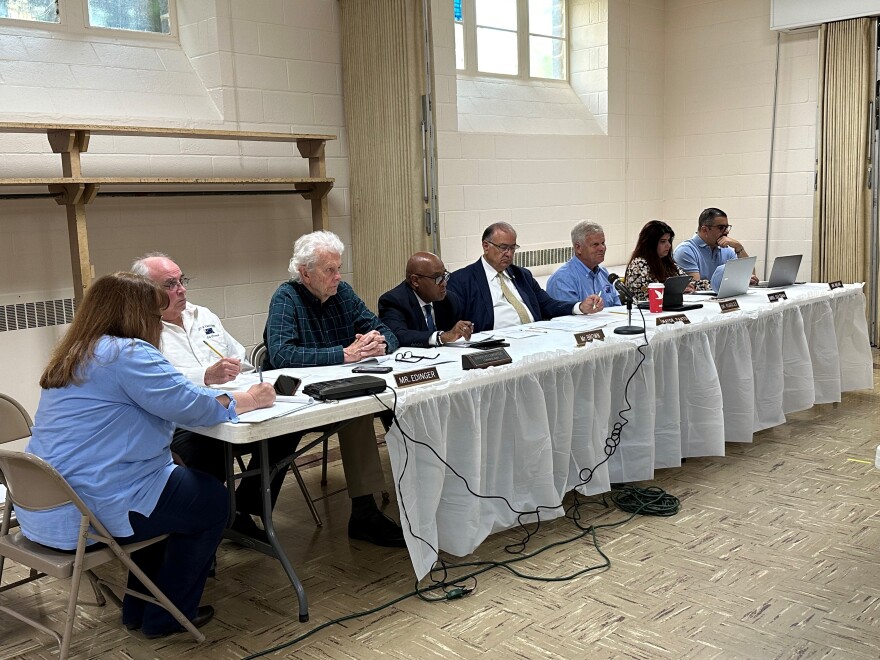EASTON, Pa. — Citizens and politicians were thrilled when Easton City Council approved a bill banning cat declawing and prohibiting animal sales in pet shops Wednesday night.
The bill, previously presented by Councilmember Taiba Sultana on April 26, includes two articles intended to prevent abuse and harm to animals via restrictions and penalties for violations.
The first addresses the ban of cat declawing, while the second focuses upon preventing pet shops in the city from selling dogs, cats, rabbits or guinea pigs.
- The measure bans cat declawing and the sale of animals in pet shops throughout the city
- Councilmember Taiba Sultana, who presented the bill, characterized the practice of declawing as cruel and hurtful
- Advocates from animal activist and rescue groups celebrated the decision
The measures passed unanimously.
The Paw Project, an anti-declawing organization, estimates between 25% and 43% of all cats in American homes are declawed.
The World Animal Foundation, which promotes animal welfare through “education, advocacy, and awareness,” notes licensed puppy mills in America produce over a million puppies per year — a figure that does not include roughly 7,000 unlicensed facilities. Annually, the organization estimates around 2.6 million puppy mill puppies are sold per year.
"You're sending a very clear and powerful message here to our granting community that this is not acceptable, that we want to promote adoption, not buying animals. Thank you so much."Sheryl Petrillo, president of the Animal Defenders of the Greater Lehigh Valley
Residents at the meeting, held at College Hill Presbyterian Church, applauded the efforts of council to protect the safety of animals in Easton.
The dangers of declawing
The declawing article notes surgical procedures in which a portion of a cat’s paw is amputated to remove a claw; surgical procedures in which a cat’s limbs, paws, or toes are cut or modified so the cat’s claws are prevented from functioning normally; and any other method of permanently preventing the normal functioning of a feline’s claws as restricted actions in Easton.
“Declawing can cause paw pain, back pain, infection, tissue necrosis (tissue death) and lameness. Removing claws changes the way a cat's foot meets the ground and can cause pain like wearing an uncomfortable pair of shoes. Improperly removed claws can regrow, causing nerve damage and bone spurs,” the Humane Society of the United States says on its website.
Penalties for violating the ordinance will result in a fine of up to $500, plus costs, for each violation, with each incident in which a cat is declawed or partially declawed counting as a separate violation.
According to Sultana, council has been working on the bill for several weeks, and she was glad it passed unanimously.
“I have a cat, I'm a mom. And that cat actually helped me, you know, for my stress relief, and all kinds of stuff,” Sultana said. “And I am fully educated on that issue. I saw that if cats don't scratch their claws, they can't get their stress out. So how can they help me with my stress?
"And it's absolutely cruel to just take the claws out. I'm glad that we are a city who actually took action.”
Abuse in puppy mills, pet store sales
The second article focuses upon prohibiting pet shops from selling or offering for sale any dogs, cats, rabbits or guinea pigs.
Retail pet shops in the city will still be able to provide space to animal shelters and rescues in order to display animals available for adoption.
In addition, shelters and rescues will be prohibited rom purchasing animals from a person who breeds animals, resells animals from a person who breeds animals, or sells dogs at auctions.
Retail shops who violate the ordinance will be subject to a fine of up to $500 for each unlawful sale of an animal.
Information within the bill particularly notes the abuse and neglect experienced by animals in puppy mills, which are often affected by overbreeding, inbreeding, a lack of veterinary care, poor accommodations and other factors highlighted by the Humane Society of the United States, which has shown that many USDA-licensed breeders breed animals in such inhumane conditions.
Furthermore, animals from puppy mills and similar setups are often more likely to have behavior and health issues.
Sultana’s bill also notes the ordinance will likely reduce pet overpopulation in the area, and limit instances in which potential owners are subject to predatory loans to purchase a high-cost pet-store animal.
The Easton Police Department has been empowered to enforce the ordinance as of 30 days past Wednesday’s meeting — the date on which the ordinance will take effect.
Community commends council
Sheryl Petrillo, president of the Animal Defenders of the Greater Lehigh Valley, commended council for passing the bill.
Petrillo has been in support of both ordinances for some time now, and even though there are no puppy mills in Easton, that does not stop pet stores and shelters in the area from acquiring animals from them, a concern she believes could very well be true.
“I'm going to thank all of you on behalf of all the animals that are in shelters throughout the Lehigh Valley, the surrounding communities and all those animals that are in the pet shops that are being transported right now from puppy mill down in the Midwest,” Petrillo said.
“Thank you. You're sending a very clear and powerful message here to our granting community that this is not acceptable, that we want to promote adoption, not buying animals. Thank you so much.”
Stephany Gallagher, president of Feline Urban Rescue and Rehab, said abolishing the “barbaric maiming of cats is both heroic and courageous, and on the cutting edge of where the rest of the country is moving.”
Gallagher said she and her team were happy with council’s action and will continue to promote a message against animal abuse throughout the region.


